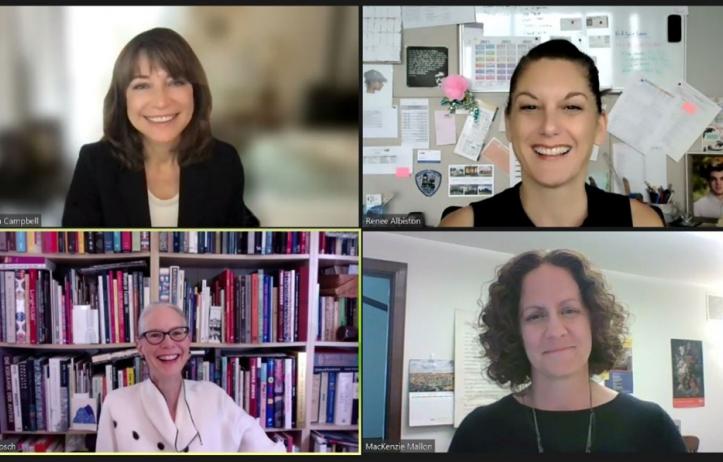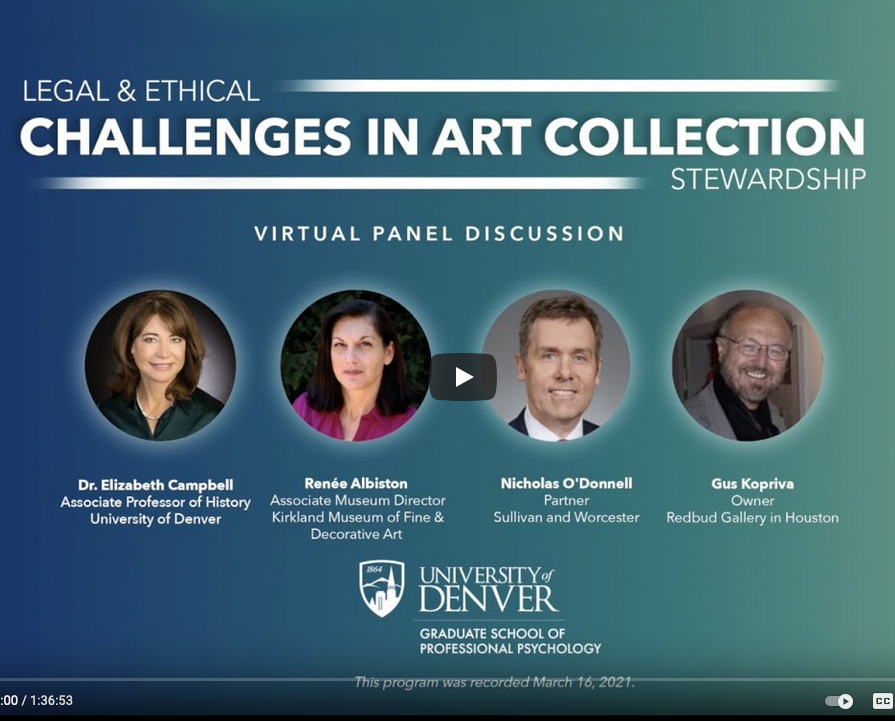Innovating During COVID: Fundamentals of Nazi-Era Art Provenance Research Training
From August 2-6, 2021, the Center for Art Collection Ethics hosted a virtual training, Fundamentals of Nazi-Era Provenance Research. Through the support of the Samuel H. Kress Foundation and the University of Denver’s Center for Professional Development, we were able to bring together scholars, claimants and students from across the globe, creating a vibrant community passionate about the ethical stewardship of plundered art. Thanks to the generosity of the Kress Foundation, twenty applicants were selected to receive a postgraduate certificate for attending the week’s events. To earn their certificate, students were required to attend every session and to collaborate with a group of their peers to write a provenance narrative and present their findings.
The Center for Art Collection Ethics’ founding director, Elizabeth Campbell, PhD, kicked off the busy week with a lecture on the mechanisms and legacy of Nazi art plunder. Next, Professor Jonathan Petropoulos of Claremont McKenna College gave a tour de force talk on Bruno Lohse, the subject of his most recent book, Goering's Man in Paris: The Story of a Nazi Art Plunderer and His World. In addition to these introductory events, panel discussions centered on the challenges of working with objects whose provenance during the Third Reich is unknown or unclear. Nicholas O’Donnell, partner at Sullivan & Worcester LLP, Boston, Katrin Stoll, owner of Neumeister Munich Art Auction House, and Christoph Heinrich, director of the Denver Art Museum, spoke as a group about the importance of stewardship and prioritizing provenance research in their respective fields of art law, art auctions and art museums. Building on this discussion, representatives from the University of Denver, Indiana University and Yale University art collections spoke about the opportunities for collaboration with researchers that are available at academic art galleries and museums.
As planning committee members for the training, Renée Albiston and MacKenzie Mallon provided case studies on provenance research from their own work at the Denver Art Museum and the Nelson-Atkins Museum, respectively. In addition, both Albiston and Mallon provided instruction on how to “read” provenance clues like stamps and signatures and how to write a provenance narrative according to the American Alliance of Museums’ Guide to Provenance Research. These sessions provided real-world examples, and speakers from the National Archives and Records Administration, the United States Holocaust Memorial Museum, the Monuments Men Foundation, the Getty Research Institute and the Jewish Digital Cultural Recovery Project presented resources available to assist with tracing provenance.
While many sessions during the week focused on academic perspectives or technical skills, one of the most powerful sessions occurred on the very first day. Monday afternoon’s panel discussion with claimants of Nazi-plundered art demonstrated the importance of provenance research for the heirs to stolen assets, as well as the diversity of claimants’ needs in the search for restitution. While Simon Goodman and Nina McGehee continue to reclaim their families’ private collections, Marianne Rosenberg’s search includes assets once held by her family and the Rosenberg gallery.
The week’s keynote address on Friday, August 6, was provided by globally renowned scholar Jane Milosch. Currently a visiting professorial fellow at the University of Glasgow, Milosch focused her presentation on her work at the Smithsonian Provenance Research Initiative (SPRI), which she founded in 2009, and her most recent book with Nick Pearce, Collecting & Provenance: A Multidisciplinary Approach (Discount coupon code: RLFANDF30). The main lesson of Milosch’s keynote, as with the entire week, was that provenance research is an ongoing process, one which is critically important to stakeholders in all areas of art stewardship.
Our team is thrilled with the success of this groundbreaking, innovative program, demonstrating ways that higher education can innovate amid the ongoing pandemic. We offer sincere thanks to all involved, especially our core instructors, Renée Albiston and MacKenzie Mallon, and ACE graduate assistant Callie Cherry. We plan to expand this course offering next summer and have programs planned for the coming year in other areas of ethical art stewardship, including African items—stay tuned!



